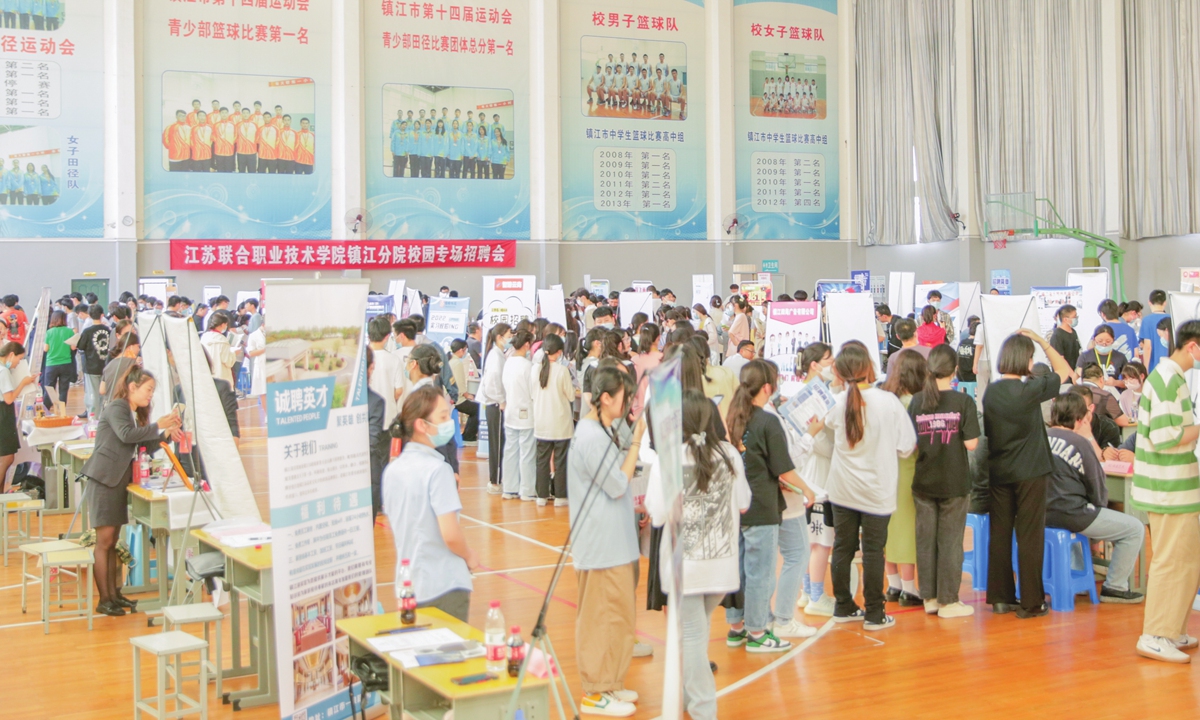
A special campus job fair is held at Zhenjiang Vocational Technical College on June 2, 2022, aiming to boost employment of graduates and facilitate the resumption of work for local companies. Photo: IC
South China's Guangdong Province to subsidize 1,000 yuan ($137) to companies that hire young people aged 16 to 24 after January 1, 2023, until December 31, in an effort to encourage the employment of young people, local authorities said in a statement on Wednesday.
Enterprises that recruit unemployed college graduates and registered unemployed youth aged 16-24, sign labor contracts and pay insurance for them will have the chance to receive subsidies, read the statement.
China announced to suspend releasing jobless data for the youth starting from August, as labor market statistics work needs improvement amid economic and social development, the National Bureau of Statistics (NBS) said on Tuesday.
The number of students in China continues to expand. In 2022, the country's population of young people aged between 16 and 24 exceeded 96 million, and over 65 million were students.
Since the main task of young people aged 16 to 24 is mastering knowledge, there are different views on whether students starting to look for jobs before graduation should be included in the labor force survey, said Fu Linghui, spokesperson of the NBS, adding that the country's statistics work and the survey and statistics of labor force need to undergo continuous improvement along with social and economic development.
Besides, China will have more than 11 million university graduates in 2023, most of whom already found jobs before graduation, Fu said citing figures from the education department, noting the rate and number of job settlements among graduates had both seen year-on-year increases.
"19 policy employment campaigns were commenced across China's state-owned enterprises and made significant progress. A series of subsidies targeting social insurance and jobs were granted to private-sector enterprises, which created 670,000 jobs for graduates," said Fu.
In addition to graduates, local authorities in Guangdong also encourage employers to actively set up positions for women with children, providing them with flexible employment options, and said that the government would provide subsidies for such enterprises.
At the same time, many places in the country, including Guangdong, are also actively supporting the development of small and micro enterprises. Guangdong said in the statement that it would encourage financial institutions to increase lending and simplify procedures for promising small and micro businesses.
According to the data from the Guangdong Provincial Taxation Bureau of the State Administration of Taxation, in the first half of 2023, Guangdong added 66.8 billion yuan in tax reduction and fee reduction and tax refund delay, of which 43.3 billion yuan was set aside for tax refund by two batches of continuous optimization and innovation preferential tax policies.
Because it plays an important role in developing the economy, expanding employment, invigorating the market, and improving people's livelihood, as the main beneficiaries of preferential tax and fee policies, micro, small and medium-sized enterprises have benefited the most, with an additional tax reduction and fee reduction and tax refund delay of 45 billion yuan, accounting for 67.37 percent.
China's urban surveyed unemployment rate stood at 5.3 percent in July, up 0.1 percentage points from June, the National Bureau of Statistics (NBS) said on Tuesday, adding that the general employment situation is stable.
Fu said unemployment issues related to university graduates will be rectified as more support measures take effect gradually, and pledged that the NBS will carry out an in-depth study and further improve labor surveys to better reflect the country's employment situation.
Global Times




